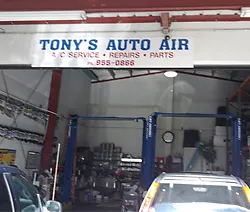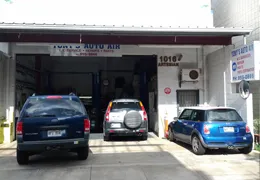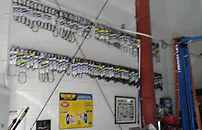Turn to Tony's Auto Air when you need an auto mechanic. When you experience car problems, you won't find a better team in the Honolulu, HI region. Besides top-quality service, you can also count on excellent workmanship and reasonable prices.
We aim to make any car issue you have a mere "bump in the road," not a major ordeal. We've been serving the Honolulu community since 1998--our record stands for itself.
FAQS
Preventative Maintenance
- What is Preventative Maintenance?
Preventative Maintenance is the regular maintenance performed on your automobile to keep it running smoothly and efficiently. Properly maintaining you vehicle will help it last longer, be safer, and be more dependable.
- What Maintenance Should I Be Doing and When?
These service recommendations are based on time or mileage, NOT on visual appearance. Your vehicle’s maintenance may differ depending on driving habits and/or owner’s manual recommendations. Check your owner’s manual and with your auto mechanic for specifics.
- Oil/Lube/Filter: 3,000 - 5,000 miles
- Tire Rotation: 3,000 - 5,000 Miles (depends on tire style)
- Whole Car Diagnosis: Yearly and before purchase/sale
- Fuel Filter: Yearly/as needed
- Battery: Yearly/as needed
- A/C: Yearly/as needed
- Radiator Coolant: Flush every two years
- Brake System Flush: Yearly
- Radiator Cap: Replace every two years
- Engine Oil Flush: 2 Years or 30,000 Miles
- Power Steering Flush: 2 Years or 24,000 miles
- EGR System Service: 2 Years or 24,000 miles
- Carbon Cleaning: 2 Years or 30,000 miles or as needed
- Throttle-Body Service: 2 Years or 30,000 miles or as needed
- Radiator & Heater Hoses: 4 Years or 60,000 miles
- Drive Belts: 4 Years or 60,000 miles
- Timing Belt: 4 Years or 60,000 miles
- Scan for Computer Codes: When “CHECK ENGINE” light is on
- Oxygen Sensor: Check owner’s manual or as needed
- If You Do My Scheduled Services Will My Manufacturer or Dealer Warranty Be Intact?
Yes. We can do all of your regular maintenance and service and your warranty will still be valid. However, the dealer must perform factory warranty and recall work. Only the dealer will complete this work at no expense to you.
Tires
- What Is TPMS?
Tire Pressure Monitoring System (TMPS) is an electronic system in your vehicle that monitors your tire's air pressure and alerts you when it falls dangerously low by turning on the tire pressure light on your dashboard. It will not alert you if your tires are overinflated. Congress passed the TREAD act which requires most vehicles made after 2006 to be TPMS equipped.
- What Is My Recommended Tire Pressure?
The recommended tire pressure is what the vehicle manufacturer requires. This information is normally written on the inside driver’s door panel. Pressure requirements may change if you are using plus sized tires.
- Is It Easy to See When My Tire Pressure Is Low?
No. Tire pressure can be under 50% infated before you are able to see a difference. This is why it is important to test your tire pressure regularly in the morning before the car has been driven.
- If I Only Need Two Tires, Do They Go on the Front or Back?
When replacing only two tires on your vehicle, new tires should always be placed on the rear of the vehicle. This helps you maintain control better on wet roads and will resist hydroplaning easier.
- What Is the Primary Cause of Tire Damage?
There are a variety of reasons that can cause tire damage, but improper inflation is the main cause we see. It's important to regularly check your tire pressure with an accurate tire gauge kept in your car.
Fluids
- What Does Viscosity Mean?
Viscosity is a measure of a fluid's resistance to flow. A fluid with low viscosity flows easily and is often called "thin" (like water). A fluid with high viscosity is often described as "thick" (like syrup).
- What Does a Viscosity Number Mean?
The viscosity index (VI) number is a measure of the relative change in viscosity of oil over a range of temperature. The higher the viscosity index number, the smaller the change in viscosity over temperature. The VI is a measure of the rate of viscosity change.
Generally, multigrade oils (0W-40, 10W-30, etc.) will have high viscosity indexes. Monograde oils (SAE 30, 40, etc.) will have lower viscosity indexes.
- My Car Smokes When I Start It. What Does This Mean?
If the smoke is blue or blue/black, it may indicate that oil is being burned along with the fuel. This could be due to worn piston rings or an oil viscosity that is too low.
If the smoke is black, it indicates that excess fuel is being burned.
If the smoke is white, it could be the moisture from the cold engine and exhaust being burned off.
Note: If there's a lot of white smoke and it continues for a while, you may have a coolant leak.
head gasket could be cracked & water goes into engine
- What Causes My Oil Warning Light to Come On?
Your oil light can come on for a variety of reasons, including:
- low oil level
- a failing oil pump
- a faulty oil-pressure sensor
- oil system blockage
- excessive foaming of the oil
- oil is leaking
- reminding you it is time to change your oil
In all cases, you should shut down your engine as quickly as it is safe to do so. Continuing to operate your engine with low oil pressure can result in serious engine damage.
- Why Do I Need to Have My Engine Oil Changed Every 3,000 Miles?
The additive in the oil starts to break down as soon as it heats up to high temperatures. Your engine will reach over 200 degrees almost every time you drive. History and tests have shown 3,000 miles is a good interval to change your oil. When you do this, you want to change the oil filter as well, which holds about a quart of oil. If you do not change the oil filter when changing the engine oil in your vehicle, you combine your clean and deteriorated engine oil, which lessens the effectiveness of the new, clean oil you just put in your vehicle.
- Should I Service My Transmission, Even Though It Is Supposed to Have a “Lifetime” Fluid?
Depending on your driving habits and use of your vehicle, you should have the “lifelong” fluid inspected and serviced at least every 100,000 miles to determine whether it’s dirty or has become contaminated somehow. This ensures we can flush and replace the fluid before it causes damage to your transmission and automobile.
Air Conditioning
- Will My Air Conditioning System Be Serviced When I Have a Normal Engine Service?
No. The air conditioning system is a separate system and therefore will not be serviced during a standard engine service appointment.
- What Gas Does My Air Conditioning System Run On?
Air conditioning systems models made in 2017 and older use R134A and models made in 2018 and newer use 1234YF refrigerant gas.
- Does My Car Use More Fuel When Using the Air Conditioning System?
It slightly uses more fuel when you use the air conditioning system. However, you would use even more fuel driving on a highway with your window down.
- What Causes the A/C Unit to Stop Working?
Possible causes include:
- compressor clutch defective
- a/c system leaking
- coolant fan not working
- not enough coolant
- a/c controlled unit not working
- electrical issue
Brakes
- How Long Do Spark Plugs Last?
This depends on the type of spark plugs that are in your car. Older cars (15-20 years old) are more likely to have standard plugs and they last 12,000-15,000 miles, newer models up to the year 2000 are platinum tipped and will last 30,000 miles. Some 2000 and newer have iridium tipped plugs and will go 90,000 to 100,000 miles.
- How Do I Know I Need New Shock Absorbers or Struts?
last about 7 years/50,000-70,000 miles.
Shock absorbers and struts that are working well mean more stable driving in every condition. When these components are worn, you may notice a rougher ride, longer quick-stopping distance, nose-diving when you apply the brakes, dripping fluid, tires that are cupping, excessive bounce after a bump, or swaying after a turn or stop.
- Why Does My Brake Pedal Vibrate When I’m Slowing Down From Freeway Speeds?
The most common cause is the brake rotor warping. This is due to improper tightening of the wheels or wheel hubs that are not properly cleaned when the rotors are installed. It could also be a bad hub. The rotors can be repaired if there is enough material on the rotor without going below the minimum thickness required for a safe rotor. Otherwise the rotor must be replaced. If the hub is the cause, it must be cleaned thoroughly, the rotor reinstalled, and the smoothness and straightness (run out) checked again.
- Why Are My Breaks Squeaking?
There could be a number of reasons the breaks on your automobile are squeaking. Some possible causes include:
- the brake pads are old
- the brake pads are defective
- the brake rotor is warped
- dust buildup on the brakes
To be sure of the cause and resolve the squeaking, contact us to schedule an appointment!
Suspension
- What Do Shocks and Struts Do?
Shocks and struts help stabilize your vehicle's movements. This increases your control when you turn, brake, accelerate, or drive across uneven road surfaces. Without shocks, your vehicle would bounce down the road and have an overall very rough ride.
- How Do I Know I Need New Shock Absorbers or Struts?
Shock absorbers and struts typically have a lifetime of 50,000-70,000 miles, depending on your driving habits. Shock absorbers and struts stabilize your vehicle in various weather conditions. When these components are worn, you may notice a rougher ride, a longer quick-stopping distance, dripping fluid, excessive bounce after a bump, or swaying after a turn or stop. If you are experiencing any of these signs, please stop by Tony's Auto Air to get your shock absorbers and struts replaced!
- What's Causing My Suspension to Make Noise?
There could be any number of reasons for the knocking and rattling of your suspension, like:
- the shock needs repaired or replaced
- leaking shock absorber
- the rear brake linings are sticking
- dull shock absorbers
- loose stabilzer bar bushings
- loose stabilizer links
- broken shock mounts
- oxidation of the coil springs
- missing or defective coil spring seats
- deformed damper rod
The suspension system makes up most of the moving components on your automobile. Give us a call to find the exact cause of the noise.







